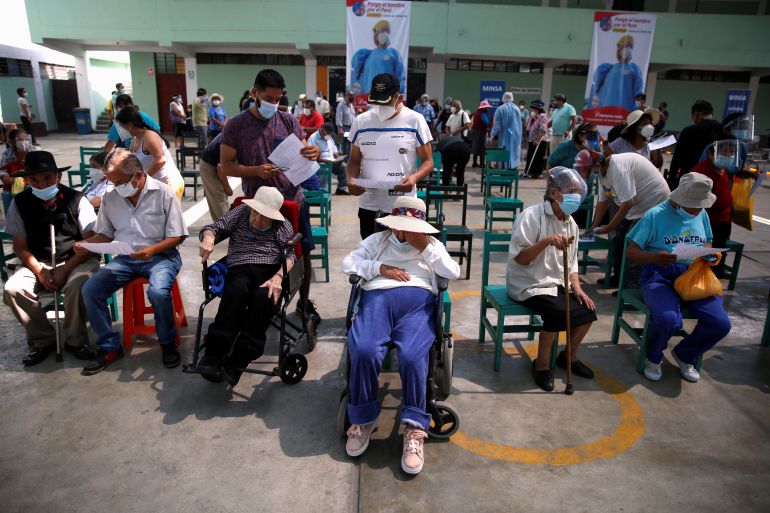Peru reports new COVID deaths record ahead of elections
Amid surge in coronavirus infections, Peruvians will go to the polls on April 11 to elect a new president and Congress.

Peru has registered its highest single-day total of coronavirus-related deaths, as millions of people across the South American country prepare to head to the polls to elect a new president and Congress next weekend.
The country’s health ministry said 294 deaths were recorded on Saturday, up from a previous record of 277 deaths reported in August.
Keep reading
list of 4 itemsMexico’s revised COVID death toll is much higher than before
‘A miracle I survived’: Younger Brazilians hit by COVID surge
As COVID cases spike, many Chileans fear toll of another lockdown
More than 5,600 new COVID-19 cases also were reported in Peru, with the country among several in Latin America struggling to contain a recent surge in infections spurred in part by new, more easily transmissible strains of the virus.
Neighbouring Chile recently postponed a vote to elect an assembly to write a new constitution due to the rise in coronavirus infections, but Peru is moving ahead with plans to hold its elections on April 11.
An opinion poll released on Thursday by Datum Internacional found that populist presidential frontrunner Yonhy Lescano had consolidated his lead over five other candidates vying for second place ahead of a likely June runoff.
Lescano, from the Popular Action party, had 12.1 percent support, putting him atop the group of 18 candidates but far short of the 50 percent needed to avoid a second round.

The poll showed Keiko Fujimori, daughter of imprisoned ex-President Alberto Fujimori, with 7.9 percent support; former football goalkeeper George Forsyth at 7.4 percent, and ultra-conservative Rafael Lopez Aliaga with 7.2 percent.
Liberal economist Hernando de Soto had 6.5 percent and left-wing candidate Veronica Mendoza had 5.7 percent.
The COVID-19 pandemic has ravaged the economy in Peru, which has witnessed political turmoil during the past year amid corruption allegations against former President Martin Vizcarra.
In February, it was revealed that Vizcarra, as well as nearly 500 Peruvian government officials, took advantage of their connections to receive COVID-19 vaccine jabs out of turn. The scandal prompted the country’s health and foreign affairs ministers to resign.
Al Jazeera’s Mariana Sanchez, reporting from the capital, Lima, said the pandemic has pushed Peru deeper into political and economic uncertainty, and recent polls show as many as 30 percent of Peruvians will vote blank next Sunday.
“Many believe the elections will not guarantee political stability,” Sanchez said.
“The candidates aren’t doing anything for us. They don’t stick to their promises. It’s only words,” said Peruvian voter Eufrasia Hurtado. “I’ll vote blank because they are all the same.”
Political analyst Giovanna Penaflor told Al Jazeera the political scene is “so weak and limited” in Peru that few see any of the presidential candidates as a good option.
“It’s as if the Titanic was going down and someone said let’s choose a new captain, but everyone is looking for a lifeboat.”
Meanwhile, the recent rise in coronavirus infections in Peru and elsewhere in Latin America, which has stretched healthcare networks to their limits and led to greater poverty and economic insecurity, has prompted warnings from experts.
The head of the Pan American Health Organization (PAHO) said last week that Peru was one of several countries in the region – alongside Brazil and Paraguay – seeing high numbers of coronavirus-related deaths.
“In the first few months of the year, the availability of oxygen and anaesthetic medicine has been threatened by the speed of new cases flooding hospitals in Brazil, Peru and other places,” Carissa Etienne said during a news briefing.
Etienne warned that without preventive action, the region could see a worse spike in coronavirus infections than what it experienced last year.
“So, let me be as clear as possible. My main guidance for places experiencing surges in transmission can be summarised in two words: stay home,” she said.